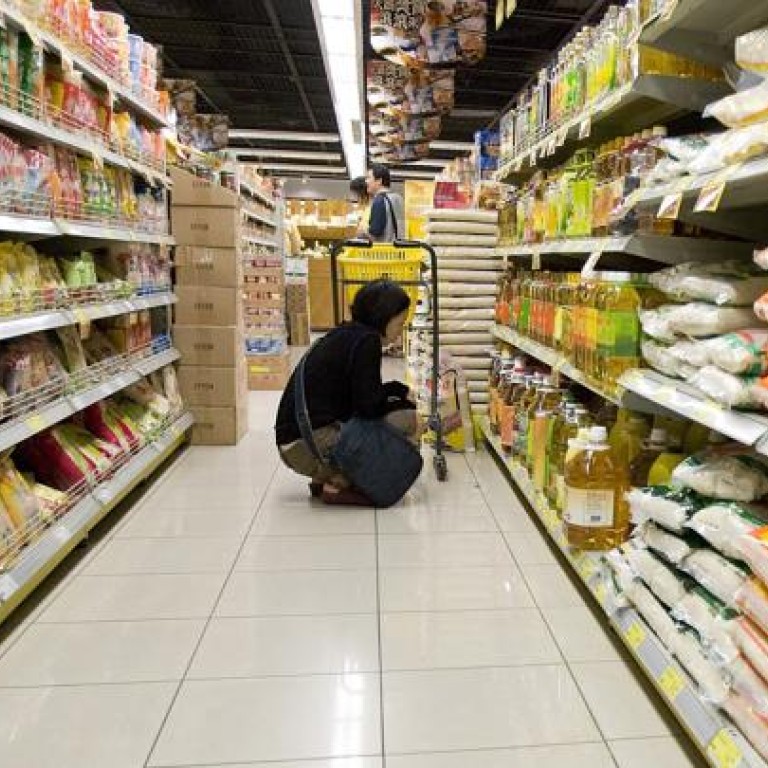
Blame greed, not the yuan, for Hong Kong's food price rises
The strengthening of the mainland currency is more of an excuse than a real reason for shopkeepers to charge more for a bite to eat in the city
"Stronger yuan to bring Hong Kong higher food prices", warned a headline in last Saturday's .
The article that followed quoted a clutch of importers and retailers, all saying much the same thing.
With the Chinese currency testing its strongest levels against the Hong Kong dollar since 1993, they all warned that the yuan's appreciation would drive up food price inflation here in Hong Kong.
It sounds like a reasonable argument. After all, the city imports much of its food from the mainland. And if the mainland currency rises against the Hong Kong dollar, then the cost of producing that food will climb in Hong Kong dollar terms.
What's more, a quick glance at recent history seems to support this view. In the first chart, the blue line shows the percentage change in value of the yuan against the Hong Kong dollar over the preceding 12 months, while the red line shows the rate of food price appreciation in Hong Kong.
As you can see, there's a pretty close match. Rapid yuan appreciation in both 2008 and last year clearly coincided with bouts of elevated food price inflation in Hong Kong.
So with the yuan currently riding high, the warnings of steeper food price rises might seem to be justified.
Please forgive me for being a cynic, however, but I just can't shake off the nasty suspicion that importers and retailers are always looking for an opportunity to jack up their prices, and a strong yuan gives them just the excuse they want.
There are some good reasons to think that movements in the yuan-Hong Kong dollar exchange rate may not be as important in driving food inflation as they first appear.
Look at the first chart again. The correlation is pretty close. But correlation is not the same as causation. Plus there are a couple of periods when the apparent link breaks down.
In the first half of 2010 food inflation picked up sharply, even though the mainland authorities kept the yuan dead flat against the US dollar, and so against the Hong Kong dollar, too.
And before it spurted higher in September, the yuan had been flat against the Hong Kong dollar over the previous 12 months. Yet local food price inflation remained stubbornly high at 5 per cent.
That's because it isn't the yuan's exchange rate that drives food price inflation in Hong Kong. It's mainland food prices.
If you don't believe that, look at the second chart, which plots mainland food inflation against Hong Kong food price rises.
At first the relationship appears much looser. Clearly, food prices are more volatile on the mainland than they are in Hong Kong, with much more exaggerated inflationary spikes.
But that makes good sense. Because local rents make up such a large component of prices in Hong Kong, changes in the wholesale cost of food have a relatively muted impact on retail price. As a result, you would expect inflation here to be less volatile than on the mainland.
Now the good news. The yuan may be strong. But mainland food prices tend to be driven by swings in global agricultural prices.
According to estimates by analysts at Goldman Sachs, a 10 per cent rise in the international price of basic agricultural commodities typically propels a 1.5 per cent increase in mainland food prices and a 1.2 per cent rise in retail prices in Hong Kong.
And following a drought-induced scare over the summer, international soft commodity prices are now retreating. Wheat prices have fallen by 9 per cent over the last couple of months. Corn is down 12 per cent and soya bean prices have slid 15 per cent. Those falls should soon feed through to the mainland and so to retail prices in Hong Kong.
So if your shopkeeper jacks up his prices and tries to blame the increase on the strength of the yuan, kick up a stink. He's just trying to pad his own margins.

